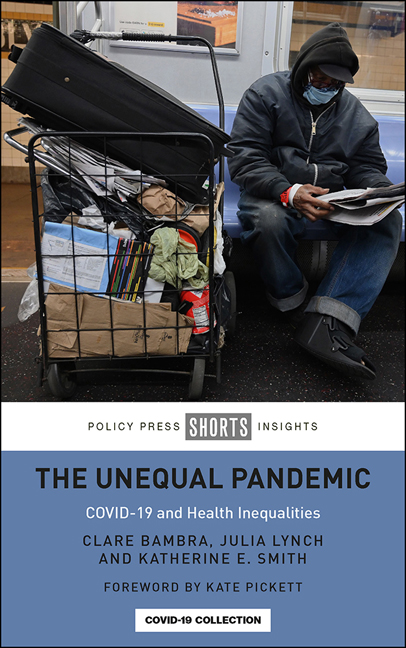Book contents
- Frontmatter
- Contents
- List of figures and tables
- About the authors
- Acknowledgements
- Foreword
- Preface
- one Introduction: perfect storm
- two Pale rider: pandemic inequalities
- three Collateral damage: inequalities in the lockdown
- four Pandemic precarity: inequalities in the economic crisis
- five Pandemic politics: inequality through public policy
- six Conclusion: health and inequality beyond COVID-19
- Notes
- References
- Index
five - Pandemic politics: inequality through public policy
Published online by Cambridge University Press: 04 January 2022
- Frontmatter
- Contents
- List of figures and tables
- About the authors
- Acknowledgements
- Foreword
- Preface
- one Introduction: perfect storm
- two Pale rider: pandemic inequalities
- three Collateral damage: inequalities in the lockdown
- four Pandemic precarity: inequalities in the economic crisis
- five Pandemic politics: inequality through public policy
- six Conclusion: health and inequality beyond COVID-19
- Notes
- References
- Index
Summary
Rara avis in terris nigroque simillima cygno.
[A rare bird upon the earth and very much like a black swan.]
Juvenal, AD 100Syndemic pandemic: black swan, white swan, or grey rhino?
In the second century CE, Roman poet Juvenal likened finding the perfect woman to seeing a black swan in the wild: both were considered so unlikely as to be impossible. But after Dutch navigator Willem de Vlamingh encountered a swan with all black feathers while exploring southwestern Australia in 1697, the black swan instead became a metaphor for erroneously assuming that something is impossible based on the limited facts at one's disposal – in this case, the observation that in Europe, all swans were white. By 2020, ‘black swan’ had come to symbolise for market investors an event with serious effects that is nevertheless so rare as to be unpredictable, based on the current state of knowledge. So when the Silicon Valley venture capital firm Sequoia Capital referred to the COVID-19 pandemic as a ‘black swan’ in a memo issued on 5 March 2020, everyone knew what they meant: something terrible and unpredictable had happened, and all we could do now was figure out how to deal with the consequences.
But, much like the actual black swan ‘discovered’ by Willem de Vlamingh, COVID-19 was quite predictable to those who were paying attention to all of the available facts. Scientists had been warning for decades that the combination of climate change and human encroachment on natural habitat made it not only possible but likely that a pandemic disease would cross over from an animal population to humans. The spread of SARS, MERS, Ebola, swine flu, avian flu and Zika should all have prepared us for this possibility. If anything, the COVID-19 pandemic was a white swan, not a black one.
The threat of growing inequities resulting from COVID-19, on the other hand, was more like a ‘gray rhino’, a metaphor coined by strategist Michele Wucker: that is, a threat that is predictable – not to say obvious – in light of existing warnings and visible evidence; is quite dangerous; and is also avoidable.
- Type
- Chapter
- Information
- The Unequal PandemicCOVID-19 and Health Inequalities, pp. 77 - 98Publisher: Bristol University PressPrint publication year: 2021



